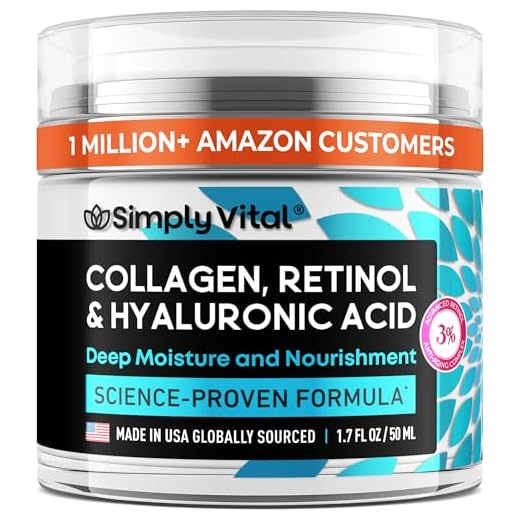







Vitamin A supports your skin health by promoting cellular regeneration and maintaining skin integrity. It regulates oil production, helping to prevent clogged pores and acne. By stimulating collagen and elastin production, it reduces the appearance of fine lines and enhances texture. Additionally, vitamin A aids in normalizing pigmentation for an even skin tone and accelerates wound healing, reinforcing your skin's defenses. It even acts as an antioxidant, neutralizing free radicals to slow aging. Understanding its various forms and sources can enhance your skincare routine and its effectiveness, revealing more benefits for your skin.
Key Takeaways
- Vitamin A maintains skin integrity by promoting cellular differentiation and regeneration of skin cells.
- It stimulates collagen production, reducing wrinkles and improving overall skin texture.
- Vitamin A regulates oil production, preventing clogged pores and minimizing acne breakouts.
- It accelerates wound healing and enhances skin's immune response for better recovery.
- Vitamin A acts as an antioxidant, neutralizing free radicals and reducing signs of aging.
Overview of Vitamin A
What makes vitamin A so essential for your skin health? This fat-soluble vitamin is critical for maintaining your skin's integrity and appearance. Vitamin A promotes cellular differentiation and regeneration, ensuring that your skin cells develop correctly. It regulates sebum production, which helps prevent clogged pores and reduces acne susceptibility. Additionally, it plays an important role in normalizing pigmentation by influencing melanin production, leading to a more even skin tone. A deficiency in vitamin A can also impair immune function, increasing the risk of skin infections and other complications, further emphasizing its significance in overall skin health maintaining photoreceptor cell function.
As a potent antioxidant, vitamin A neutralizes free radicals that can damage skin cells, ultimately accelerating signs of aging like wrinkles and fine lines. Furthermore, it supports the formation of collagen and elastin, two proteins essential for maintaining skin firmness and elasticity, contributing to a youthful look.
However, a deficiency in vitamin A can lead to various skin issues, such as dryness, rough texture, and delayed wound healing. This highlights the importance of adequate vitamin A intake for overall skin function. By ensuring you have enough vitamin A in your diet, you can better protect your skin and enhance its health and well-being.
Skin Benefits of Vitamin A
Numerous skin benefits stem from the incorporation of vitamin A into your skincare routine. This powerful nutrient plays a pivotal role in stimulating collagen and elastin production, which helps reduce wrinkles and fine lines while enhancing overall skin texture. By promoting the synthesis of these essential proteins, vitamin A effectively combats the signs of aging, giving your skin a more youthful appearance. In addition, vitamin A's antioxidant properties can help protect skin cells from damage caused by environmental stressors, additionally supporting skin health.
Additionally, vitamin A normalizes pigmentation by regulating tyrosinase activity, leading to a more even skin tone and reduced hyperpigmentation. If you struggle with acne, this vitamin can be particularly beneficial as it regulates oil production, preventing clogged pores and minimizing breakouts.
Moreover, vitamin A accelerates wound healing and supports your skin's immune system, enhancing overall skin health and resilience. Topical retinoids derived from this vitamin promote increased cell turnover, improving skin texture and addressing signs of photoaging, such as roughness and pigmentation irregularities.
Incorporating vitamin A into your skincare regimen can considerably boost your skin's appearance and health, making it a valuable addition for anyone seeking radiant, youthful skin.
Sources of Vitamin A
Understanding the sources of vitamin A is crucial for maintaining ideal skin health. Vitamin A exists in two primary forms: preformed vitamin A (retinoids) and provitamin A (carotenoids). You'll find preformed vitamin A in animal products such as liver, eggs, and dairy. In contrast, carotenoids, including beta-carotene, are abundant in plant-based foods like carrots, sweet potatoes, and leafy greens. Adequate intake contributes to overall wellness and reduces health risks, making it essential for skin health and immune function the importance of vitamin A.
To meet your daily needs, the recommended dietary allowance (RDA) for vitamin A varies by age and gender, with an intake of 400 mcg RAE daily suggested for individuals aged 4 and above. In the U.S., many foods are fortified with vitamin A, ensuring sufficient intake for most people and helping to reduce the risk of deficiency. Although vitamin A deficiency can lead to skin issues and vision problems, such deficiencies are rare in developed countries due to a generally adequate food supply.
For those following a plant-based diet, beta-carotene serves as an important source of vitamin A, as the body converts it into retinol. By incorporating a variety of both animal and plant sources, you can effectively support your skin's health through adequate vitamin A intake.
Safety and Side Effects
When considering vitamin A for skin health, it is essential to be aware of its safety and potential side effects. High doses, particularly in the form of retinoids, can lead to dryness, irritation, and peeling of the skin. It's important to use these products cautiously and monitor your skin's reaction. While provitamin A, such as beta-carotene, is generally considered safer, excessive amounts may cause temporary skin discoloration.
Certain health conditions and medications can interact with vitamin A, so consulting with a dermatologist before starting any vitamin A-based treatment is necessary. Long-term use of retinoids may lead to cumulative side effects, including increased skin sensitivity and a higher risk of sunburn. As a result, gradual acclimatization and regular monitoring of your skin's response are significant.
Pregnant individuals must avoid high doses of vitamin A due to the risk of teratogenic effects. Always seek professional advice before using vitamin A formulations during pregnancy. Prioritizing safety and understanding potential side effects will help you make informed choices for your skin health while minimizing risks associated with vitamin A.
Vitamin A in Acne Treatment
Vitamin A plays an essential role in acne treatment, especially in the form of topical retinoids. These compounds are effective due to their ability to promote cell turnover and prevent clogged pores. Tretinoin, a widely studied topical retinoid, notably reduces the number of inflammatory lesions by enhancing keratinocyte turnover and helping to expel mature comedones. Research shows that applying isotretinoin gel (0.05%) for just 14 weeks results in a 55% reduction in inflammatory lesions, compared to only 25% with a placebo.
Topical retinoids also decrease sebum production by inhibiting the activity of sebaceous glands, which further aids in acne management. By addressing both clogged pores and excess oil, these treatments tackle key contributors to acne formation. Additionally, long-term use of topical retinoids can enhance overall skin texture and diminish signs of photodamage, offering benefits beyond acne treatment alone. Incorporating vitamin A through these retinoids is a strategic approach to achieving clearer skin while improving its overall health. If you're dealing with acne, considering topical retinoids could be a pivotal step in your skincare regimen.
Role in Skin Healing
Harnessing the power of vitamin A can greatly enhance skin healing. This essential nutrient plays a fundamental role in stimulating collagen production, which boosts skin firmness and elasticity. By promoting the immune system's function within the skin, vitamin A accelerates the healing process, aiding recovery from injuries and irritation.
Retinoids, a potent form of vitamin A, increase cell turnover. This process helps shed damaged skin cells, replacing them with healthier ones and greatly improving overall skin texture. The influence of vitamin A on fibroblast activity is essential for forming new skin cells, critical for effective wound repair and maintaining a youthful appearance.
Moreover, vitamin A normalizes pigmentation and reduces post-inflammatory hyperpigmentation, contributing to a more even skin tone during the healing process. By incorporating sources of vitamin A or retinoids into your skincare routine, you're likely to experience faster recovery and a revitalized complexion. It's important to recognize that the benefits of vitamin A extend beyond mere cosmetic enhancements, as it actively supports your skin's natural healing mechanisms. Embracing this vitamin can make a notable difference in your skin's health and resilience.
Importance of Consistency
Achieving ideal skin health demands a consistent approach to skincare, particularly with vitamin A. When you regularly apply vitamin A, its effects accumulate over time, leading to significant improvements in your skin's quality and appearance. This consistent use is essential for maintaining optimal vitamin A levels, which help prevent common skin issues like acne, pigmentation irregularities, and signs of aging.
Incorporating vitamin A into your daily skincare routine not only enhances its benefits but also increases the efficacy of other skincare products. This synergy amplifies your results, making consistency vital for achieving your desired outcomes. As you monitor your skin's response to vitamin A, you can make necessary adjustments in your regimen, ensuring that your skin fully reaps the benefits.
Committing to a daily routine that includes vitamin A fosters lasting improvements, promoting resilient and youthful skin. By prioritizing consistency, you're laying the groundwork for healthy skin that looks vibrant and rejuvenated. Remember, the journey to achieving your ideal skin appearance relies on your dedication to a consistent vitamin A regimen. So, stick with it, and over time, you'll see the remarkable benefits unfold.
Vitamin A and Pregnancy Safety
Steering skincare during pregnancy requires careful consideration, especially when it comes to vitamin A. While maintaining skin health is important, you'll need to be cautious about the use of vitamin A formulations. High doses of retinoids, particularly in topical products, may carry teratogenic risks, making professional consultation crucial before you proceed.
Research shows that certain vitamin A derivatives can penetrate the skin effectively, but their safety during pregnancy is still debated among professionals. It's essential to recognize that vitamin A deficiency can impact your skin health, yet excessive intake—especially when combined with prenatal vitamins—can lead to adverse fetal outcomes.
To guarantee the safety of both you and your developing baby, always discuss your skincare routine with a healthcare provider. They can guide you on how to balance effective skincare while minimizing risks. With personalized advice, you can navigate the complexities of vitamin A usage during pregnancy, ensuring that your skin health doesn't come at the expense of fetal safety. Prioritizing professional guidance will help you make informed choices throughout your pregnancy journey.
Conclusion
Incorporating vitamin A into your skincare routine can transform your skin like nothing else. Its powerful benefits, from enhancing cell turnover to aiding in healing, are essential for maintaining healthy skin. Whether you're dealing with acne or seeking to improve your overall complexion, consistency is key. However, always prioritize safety, especially during pregnancy. By understanding its role and sources, you can harness vitamin A's full potential for radiant, youthful skin.






